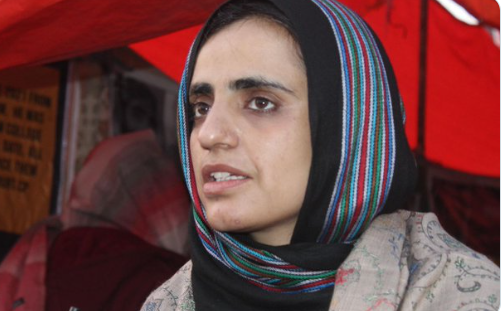Recently, activist Mahrang Baloch addressed the International Oppressed Peoples Conference in Islamabad. According to the Baloch Yakjehti Committee (BYC), this conference highlights the plight of Balochistan in the global struggle against injustices. In the conference, Dr. Mahrang passionately discussed the serious human rights abuses and violence that the Baloch people and other oppressed peoples have been facing by the Pak establishment. She stated “Our gathering underscores a shared concern – the violation of fundamental human rights and the prevalence of Pak Army violence worldwide. While our focal point involves the challenges faced by the Baloch people, it also extends to a broader context, encapsulating all individuals who find themselves subject to oppression and brutality.”
She added that there has been continuous fighting in Balochistan for the past 75 years. Unfortunately, the resolution of political disputes has frequently been overshadowed by coercive actions like military interventions, enforced disappearances, extrajudicial killings, forced relocation, collective punishments, and restrictions on the right to free speech. Almost all of Balochistan’s citizens have been negatively impacted by this ongoing use of force and violence.
Under Dr. Mahrang’s leadership, the BYC has led a movement that cuts across geographical borders. For the Baloch people, this movement represents hope, and it serves as an example for all the oppressed countries in the region.
Her speech covered significant instances of oppression in Balochistan, such as the 2014 discovery of mass graves in the Totak area of Khuzdar district. Dr Mahrang urged the international community to acknowledge the seriousness of the atrocities as a form of genocide as she passionately described the dire circumstances facing the Baloch nation.
The forcible displacement of numerous families from their hometowns in Balochistan was an additional crucial matter that Dr. Mahrang addressed. She emphasized the lack of adequate response from the human rights organisation and the critical need to address the issue of these impacted individuals.
The conference also presented the testimonies of families who have lost loved ones to extrajudicial killings and enforced disappearances by the Pak Army. Dr Mahrang discussed the difficulties these families have to deal with, highlighting the suffering that is experienced by all when someone is taken from them against their will. She mentioned that there are people in this conference whose loved ones were killed without cause. Famous people like Mama Qadir Baloch, a prominent human rights advocate, witnessed his son Jalil Rehki’s extrajudicial death following his forced disappearance. Balach Baloch, the brother of Najma Baloch, met a similar end when he was extrajudicially killed following his forced disappearance, even after being presented in court. “I received the mutilated body of my father, Ghaffar Langov, after two years of his enforced disappearance,” Dr Mahrang said.
She also mentioned Manzoor Pashteen, a detained Pashtun leader of Pashtun Tahafuz Movement who has been unlawfully and continuously detained for the past two months for his advocacy of Pashtun rights.
Dr Mahrang brought attention to the suffering of other minorities, pointing out that the Hazara community has been subjected to mass murders because of their religious identity for the previous 20 years. In addition, there are extrajudicial killings and forced disappearances of Shia, Sindhis, and Muhajirs. The religious identities of Hindu and Christian communities have been the source of oppression for decades. Furthermore, even in Punjab (Pakistan) today, political activists and journalists have forcibly disappeared based on their political affiliations and freedom of expression.
“Yet, today, we stand united with all the ongoing people’s struggles in this region, whether it be the ongoing sit-in in Chaman or the ongoing protest in Gilgit-Baltistan. We stand in solidarity with Muhajirs, Sindhis, Hazaras, Pashtuns, Shias, Hindus, Christians, and all oppressed communities and support their struggle. Moreover, the people of Kurdistan, Palestine, Afghanistan, and many other oppressed communities in the world”, Dr Mahrang added.
Dr. Mahrang praised and acknowledged the role of women in the movements of oppressed nations. She emphasized the historical role played by Baloch women in the ongoing fight against the “genocide in Balochistan,” underscoring the need for women from all oppressed countries to work together in this struggle.
Dr. Mahrang expressed gratitude to journalists and human rights advocates for their valuable contributions to the movement as she concluded her speech. She urged these people and groups to support the struggles of oppressed peoples around the world, including the Baloch nation.
The International Conference of Oppressed Peoples sought to provide a forum for the global oppressed peoples to unite and support one another in their struggles. In the name of the Baloch Yakjehti Committee, Dr. Mahrang conveyed his sincere appreciation to all participants for their invaluable contributions to the success of the conference.

